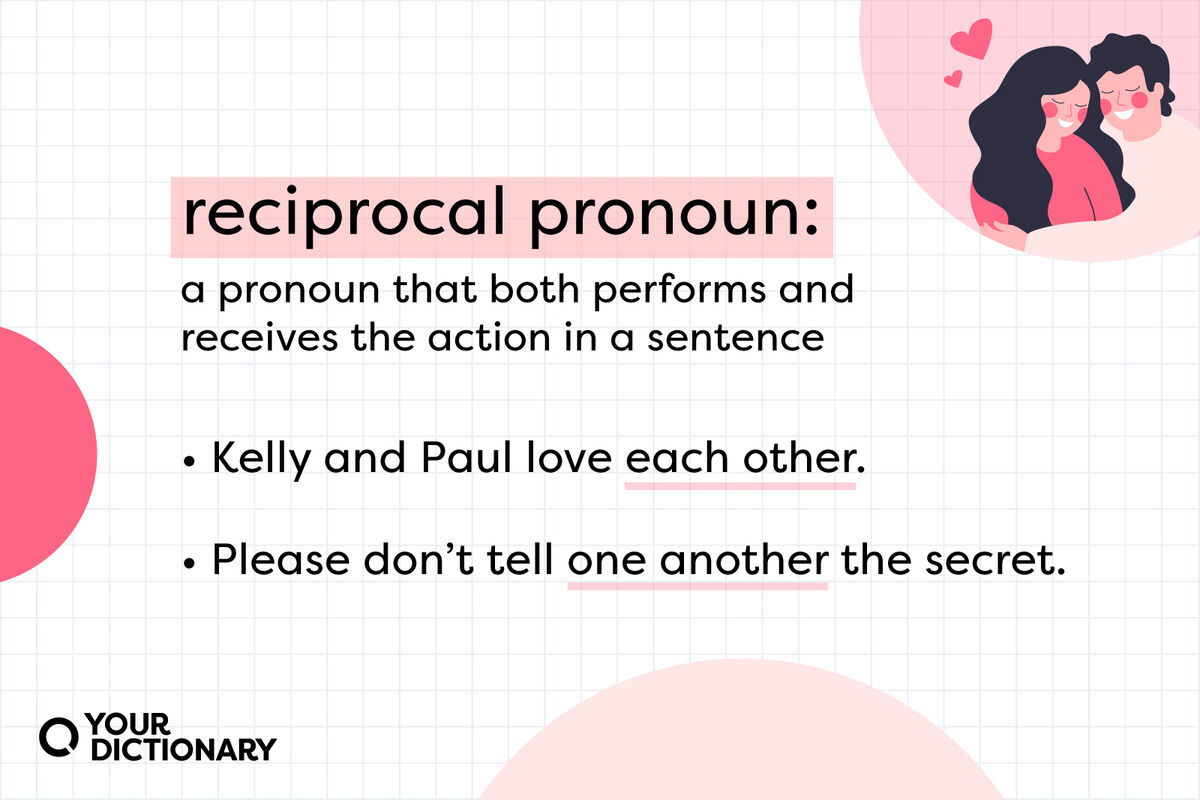
Pronouns have a lot of problems. They can be a little confusing, or a little possessive (in the case of possessive pronouns, anyway). But pronouns can also be fair and generous when they want to be. Take reciprocal pronouns, for example — these pronouns are so thoughtful that they share the verbs equally in a sentence. What nice little parts of speech!
What Is a Reciprocal Pronoun?
Reciprocal pronouns are pronouns that both perform and receive the action in a sentence. They have a mutual relationship, which makes sense — reciprocal means “done in return.”
In a sentence, reciprocal pronouns replace nouns to show that an action was done to two individuals equally.
- Juan and Javi have known each other for years.
(Juan has known Javi for years, and Javi has known Juan for years.) - My dad and I always try to beat one another in tennis.
(My dad tries to beat me in tennis, and I always try to beat him in tennis.) - The bride and groom gave each other thoughtful gifts.
(The bride gave the groom a thoughtful gift, and the groom gave the bride a thoughtful gift.) - Please speak respectfully to one another in this classroom.
(Every student should speak respectfully to every other student.)
List of Reciprocal Pronouns
The good news about reciprocal pronouns (besides their grammatical generosity) is that there are only two.
- each other
- one another
Is There a Difference Between “Each Other” and “One Another”?
Some believe that each other is an informal pronoun and one another belongs in formal writing. Others think that each other means “between two people,” while one another means “among more than two people.” And still others think that these reciprocal pronouns are interchangeable.
Grammatically speaking, those last people are correct — it doesn’t really matter if you say each other or one another. They’re equally popular online (though each other has had the edge in literature for around 300 years), and even the Oxford English Dictionary lists them as synonyms.
The only real difference is that you can split up each other in a sentence (Each told the other the truth), but you can’t do the same for one another (One told another the truth — the verb isn’t reciprocated in this sentence).
How To Use Reciprocal Pronouns
Because there are only two reciprocal pronouns that function in the same way, it should be pretty simple to use them in a sentence. And it is — if you use them in these very specific ways.
Reciprocal pronouns must be doing the same thing, and they must refer to at least two nouns, which can be plural nouns or compound subjects (two subjects in a sentence).
Examples of Reciprocal Pronouns as Direct Objects
Unlike other pronouns, reciprocal pronouns can’t function as subject pronouns, meaning that they can’t perform the action in a sentence. They must receive the action from the sentence, making them object pronouns only.
- Do you and Melissa like each other?
- The pilots couldn’t see each other.
- I love the way my friends help one another.
- Don’t blame one another for the accident.
Examples of Reciprocal Pronouns as Indirect Objects
When two nouns receive the direct object from each other, the reciprocal pronoun functions as an indirect object.
- Mark and Robin sent each other sweaters for Christmas.
- The whole school gave each other the flu this winter.
- My colleagues made one another homemade cookies.
- We always tell one another our secrets.
Examples of Reciprocal Pronouns as Objects of the Preposition
Sometimes, you’ll see reciprocal pronouns as an object of a preposition to show the direction of the action.
- The turkey and the pig glared at each other.
- We’re just creating more work for each other.
- Please be kind to one another.
- Why must you always fight with one another?
Examples of Reciprocal Pronouns as Possessive Nouns
Finally, you might find reciprocal pronouns functioning as possessive nouns — words that show possession of another noun.
- Don’t touch each other’s lunch boxes.
- Marcy and Elissa always sleep at each other’s houses.
- Take a moment to listen to one another’s opinions.
- We aren’t allowed to copy one another’s homework.
Reciprocal Pronoun vs. Indefinite Pronoun
Each other and one another are nifty reciprocal pronouns, but that’s not all they can do. When you take them apart, each, other, one, and another can function as singular indefinite pronouns — words that replace non-specific singular nouns.
- Reciprocal pronoun - They helped each other with the groceries.
- Indefinite pronoun - Each bought their own groceries.
- Reciprocal pronoun - Kelly and Paul love one another.
- Indefinite pronoun - One loves their spouse in a marriage.
Reciprocal Pronoun vs. Reflexive Pronoun
Another common confusion lies between reciprocal pronouns and reflexive pronouns. However, reflexive pronouns don’t receive the action equally in a sentence — the subject simply does the action to itself.
- Reciprocal pronoun - The kids congratulated each other. (Each kid congratulated another kid.)
- Reflexive pronoun - The kids congratulated themselves. (Each kid congratulated him or herself.)
- Reciprocal pronoun - We gave one another Easter baskets this year. (Each person gave another person an Easter basket.)
- Reflexive pronoun - We gave ourselves Easter baskets this year. (Each person gave him or herself an Easter basket.)
Be Proactive With Pronouns
Pronouns may seem tricky and confusing, but they’re really here to help — even the non-reciprocal ones. For more pronoun practice, check out the rules of pronoun agreement, and learn why the singular they is actually perfectly fine (and has been for centuries).